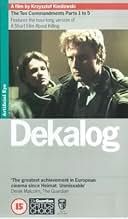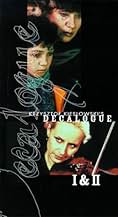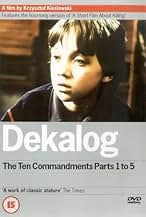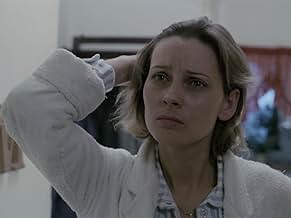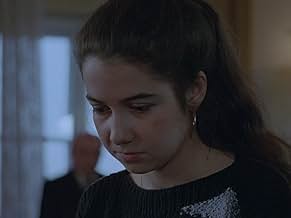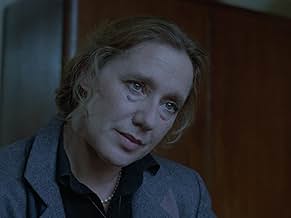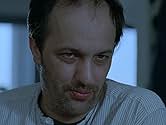Dekalog, jeden
- Episode aired Dec 10, 1989
- TV-MA
- 55m
IMDb RATING
8.5/10
8.1K
YOUR RATING
A woman worries about her nephew's spiritual education, whose life and his father's are run on their home computer.A woman worries about her nephew's spiritual education, whose life and his father's are run on their home computer.A woman worries about her nephew's spiritual education, whose life and his father's are run on their home computer.
- Director
- Writers
- Stars
Magdalena Mikolajczak
- Journalist
- (as M. Sroga-Mikolajczyk)
- Director
- Writers
- All cast & crew
- Production, box office & more at IMDbPro
Featured reviews
Like in a Kafka book, a character is cool and rational, but suddenly sees everything around falling down. He painfully sees that the mystery of evil can't be explained by the faith in God or by the bare cause-effect paradigm. Mourning is indeed more painful, if you can't explain why an accident happens, and the movie is about this (or, my interpretation). Despite something ingenuity about computers and despite the low budget, the movie is tremendous and wonderful.
It's not necessary at all to repeat the worth and the offer of the 'Dekalog''s director in the cinema history and in the symbolic interaction. I read all the critic reviews that cover totally this part.
As the most of these reviews are written at about during the first decade of 2000's, I would like to underline the connection of this film in the 2020's. The technology steps on, but the uncertainty of the life doesn't change. This film should help us to realize that Artificial Intelligence and the digitalization of our lifes cannot transform the human nature in supernatural superiority.
"Thou shalt love the Lord thy God with all thy heart, and with all thy soul, and with all thy mind'. No matter if against that the communist computer science of the late '80s or the neo-liberal AI of the 2020s is placed.
As the most of these reviews are written at about during the first decade of 2000's, I would like to underline the connection of this film in the 2020's. The technology steps on, but the uncertainty of the life doesn't change. This film should help us to realize that Artificial Intelligence and the digitalization of our lifes cannot transform the human nature in supernatural superiority.
"Thou shalt love the Lord thy God with all thy heart, and with all thy soul, and with all thy mind'. No matter if against that the communist computer science of the late '80s or the neo-liberal AI of the 2020s is placed.
I've seen parts one, seven, and eight. Of the three Part One is definitely the most moving. Somehow it just seemed so realistic. It really drove the point of human logic being fallible. In fact, I was so absorbed in the movie that immediately after watching it I almost felt like I had been the one involved in the spiritual crisis.
I really appreciate how Kieslowski managed to convey the essence of the first commandment (Thou shalt have no other God before me) without being preachy. In fact, religion hardly came into play at all. This gave the film a more universal appeal, by expressing themes that are relevant to those outside of the Christian religion.
The cinematography is impressive, especially this one scene where an ink blot appears from nowhere on the main character's work. It really sets the stage for the ending.
Of all Kieslowski's works that I have seen so far, this is easily the one I appreciate the most.
I really appreciate how Kieslowski managed to convey the essence of the first commandment (Thou shalt have no other God before me) without being preachy. In fact, religion hardly came into play at all. This gave the film a more universal appeal, by expressing themes that are relevant to those outside of the Christian religion.
The cinematography is impressive, especially this one scene where an ink blot appears from nowhere on the main character's work. It really sets the stage for the ending.
Of all Kieslowski's works that I have seen so far, this is easily the one I appreciate the most.
Decalogue: One, The (1989)
**** (out of 4)
The first film out of ten tells the story of a father (Henryk Baranowski) and his son (Wojciech Klala) who do everything they can together. The father teaching his son that any of life's problems can be solved through mathematics and that there can be done on their high tech computer. One day the son finds his Christmas gift, a pair of skates, and asks his father if he can go out on the lake. The father does the math on the computer and determines that the ice is strong enough to hold his son and lets him go but soon something isn't right. This first film is centered around the verse "I am the Lord thy God; thou shalt have no other God but me" and it's really interesting how the director/writer uses this popular commandment and yet doesn't tell the story in a traditional way. This was the first film I've seen from the director so I'm really not sure if this was the right place to start or not but this film certainly leaves an impression on a new viewer. I've seen countless films that deal with religion but never one as unique as this one here because the usual way a religious story is told isn't found here as this work comes off totally original and unlike anything I've seen before. I think everyone can read that verse and decide what it means yet the way everything is handled here just makes that saying even more interesting. One could debate how the father was bringing his son up in comparisons to how his sister (Maja Komorowska) would do the job. There are so many calm and quiet moments in this film that it's easy not to pick up on the power behind them. The most noticeable sequence is the mysterious man (Artur Barcis) seen sitting besides the lake. An even more powerful scene happens when the father spills some ink. You can say the spilling of the ink means nothing yet the director gets the point he wants to make across so perfectly that it comes off quite chilling. The performances from the three stars are incredible to say the least and that's certainly true for the young boy who is extremely remarkable considering his young age. There are many entertaining or great films that hit you while you watch them but later the movie just fades from your memory. This one here is the type that you might not realize how powerful it is until minutes, hours or even days later when the memory is still with you and you come to see and feel new things about it. I'm only minutes away from the movie coming to an end and its impact is just slipping into me.
**** (out of 4)
The first film out of ten tells the story of a father (Henryk Baranowski) and his son (Wojciech Klala) who do everything they can together. The father teaching his son that any of life's problems can be solved through mathematics and that there can be done on their high tech computer. One day the son finds his Christmas gift, a pair of skates, and asks his father if he can go out on the lake. The father does the math on the computer and determines that the ice is strong enough to hold his son and lets him go but soon something isn't right. This first film is centered around the verse "I am the Lord thy God; thou shalt have no other God but me" and it's really interesting how the director/writer uses this popular commandment and yet doesn't tell the story in a traditional way. This was the first film I've seen from the director so I'm really not sure if this was the right place to start or not but this film certainly leaves an impression on a new viewer. I've seen countless films that deal with religion but never one as unique as this one here because the usual way a religious story is told isn't found here as this work comes off totally original and unlike anything I've seen before. I think everyone can read that verse and decide what it means yet the way everything is handled here just makes that saying even more interesting. One could debate how the father was bringing his son up in comparisons to how his sister (Maja Komorowska) would do the job. There are so many calm and quiet moments in this film that it's easy not to pick up on the power behind them. The most noticeable sequence is the mysterious man (Artur Barcis) seen sitting besides the lake. An even more powerful scene happens when the father spills some ink. You can say the spilling of the ink means nothing yet the director gets the point he wants to make across so perfectly that it comes off quite chilling. The performances from the three stars are incredible to say the least and that's certainly true for the young boy who is extremely remarkable considering his young age. There are many entertaining or great films that hit you while you watch them but later the movie just fades from your memory. This one here is the type that you might not realize how powerful it is until minutes, hours or even days later when the memory is still with you and you come to see and feel new things about it. I'm only minutes away from the movie coming to an end and its impact is just slipping into me.
This is the first film in the celebrated series of ten. Pay attention and the filmmaker introduces himself to us and indicates what is to come.
It is a particularly Polish idea (especially during communist rule) to have a superficial story and a more important subtext woven underneath. In this case, we have one level, ostensibly each film being derived from one of the ten commandments, in order. (This isn't quite true, but never mind.)
On that skeleton, Kieslowski's collaborator has written some fairly deft scenarios, each with an obvious problem and moral. Under that narrative, Kieslowski plants his own, purely cinematic insights, insights that often (but not here) are independent of the story.
In this film, those insights are on the nature of narrative, watching and calculation as it pertains to art. If you see it, you can readily extract a phrase to describe what he intends, but the point is that no such sum should ever be derived from what he does.
I've read all sorts of comparisons between this artist and others that seem to miss the point. Only in this one of the ten does our man brush up against concerns shared by Kubrick. But for Stanley, it was his reason to be. In this case, it is merely an essay on what is to follow.
Most filmmakers position themselves as one of the seven types of watchers that are available. All these choices are external of the narrative in the most important way. Kieslowski chooses to place himself, his eye (and therefore us) within the shared skin of the characters. It is a delicate trick, resulting from thousands of decisions a minute, made more difficult by working with a different camera operator each film.
But it is a matter of intuition, and cannot possibly be calculated or written in any way (other than giving the metaphysically obsessed character here -- someone who literally teaches semiotics -- the same name). His model is Tarkovsky before he drifted too close to the hamfisted Bergman.
Ted's Evaluation -- 3 of 3: Worth watching.
It is a particularly Polish idea (especially during communist rule) to have a superficial story and a more important subtext woven underneath. In this case, we have one level, ostensibly each film being derived from one of the ten commandments, in order. (This isn't quite true, but never mind.)
On that skeleton, Kieslowski's collaborator has written some fairly deft scenarios, each with an obvious problem and moral. Under that narrative, Kieslowski plants his own, purely cinematic insights, insights that often (but not here) are independent of the story.
In this film, those insights are on the nature of narrative, watching and calculation as it pertains to art. If you see it, you can readily extract a phrase to describe what he intends, but the point is that no such sum should ever be derived from what he does.
I've read all sorts of comparisons between this artist and others that seem to miss the point. Only in this one of the ten does our man brush up against concerns shared by Kubrick. But for Stanley, it was his reason to be. In this case, it is merely an essay on what is to follow.
Most filmmakers position themselves as one of the seven types of watchers that are available. All these choices are external of the narrative in the most important way. Kieslowski chooses to place himself, his eye (and therefore us) within the shared skin of the characters. It is a delicate trick, resulting from thousands of decisions a minute, made more difficult by working with a different camera operator each film.
But it is a matter of intuition, and cannot possibly be calculated or written in any way (other than giving the metaphysically obsessed character here -- someone who literally teaches semiotics -- the same name). His model is Tarkovsky before he drifted too close to the hamfisted Bergman.
Ted's Evaluation -- 3 of 3: Worth watching.
Did you know
- GoofsIn the scene where Krzysztof is in the bathroom and looks in the mirror to see the ambulance, the top of the head of the camera operator is also visible in the mirror.
- Quotes
Computer: I am ready _
Details
Contribute to this page
Suggest an edit or add missing content

